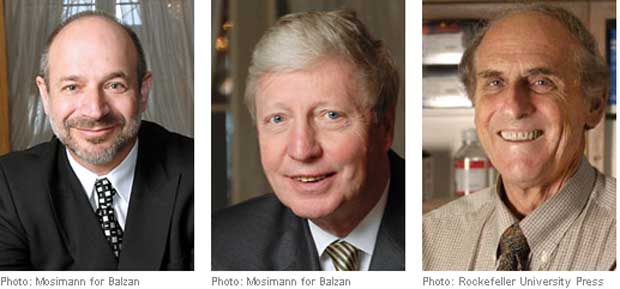Three men whose work helped uncover how the immune system works, and in so doing identified three milestones in an evolutionary path extending 2 billion years into the past, were awarded the Nobel Prize in Physiology or Medicine on Monday.
This year's award is unique in the 110-year history of the world's most famous prize in that one of the recipients - Ralph M. Steinman of Rockefeller University - was dead when the award was announced. Rules stipulate that recipients must be living.
Steinman, 68, died of pancreatic cancer on Friday after four years of treatment that included experimental therapy based in part on discoveries he'd made. Scientists at Stockholm's Karolinska Institute, who choose the medicine or physiology winners for the Nobel Foundation, didn't learn of his death until Monday morning. Sharing the award with him were Bruce A. Beutler of the Scripps Research Institute in San Diego and Jules A. Hoffmann of the Institute for Molecular Cell Biology in Strasbourg, France.
After eight hours of hurried consultation and research, the foundation decided to let the award stand. It is treating the events as if Steinman had died between the announcement and the award ceremony in December - a situation in which an award to a deceased recipient is allowed.
"The decision to award the Nobel Prize to Ralph Steinman was made in good faith, based on the assumption that the Nobel Laureate was alive . . . The decision . . . thus remains unchanged," the foundation announced late in the afternoon.
"It's been a surreal and bittersweet day" said Adam Steinman, a 38-year-old law professor in New York who is one of the winner's children. He, his two sisters, who live on the West Coast, and their mother gathered last week. They were still together when they awoke to e-mail messages announcing the award.
"We are obviously devastated by his passing," said Adam Steinman, who teaches at Seton Hall University. "But it was a real gift that we were able to be here in his final days, and now to celebrate this wonderful accomplishment."
Ralph Steinman, who grew up in Quebec but became a naturalized U.S. citizen, received the award for his discovery in 1973 of the dendritic cell. It "presents" molecular fragments of microbial or tumor cells to the immune system like a dog bringing a bone to its master. That leads to a cascade of events culminating in the production of antibodies or cells specially targeted at the foreign invader.
As part of his treatment, Steinman had some of his own dendritic cells removed, exposed to molecular fragments of his own tumor, and then reinfused into his bloodstream. Researchers believe this may give the immune system a boost in fighting the cancer. It is one of several applications of Steinman's research.
"He certainly deserved to get this award. He was a man who knew how to walk uphill right from the start," said his first graduate student, Michel Nussenzweig, 56, who is also at Rockefeller University. "For the first 10 years he was doing this work nobody even believed it."
The other two winners, Beutler and Hoffmann, won for unlocking secrets of so-called "innate immunity," a more primitive form of protection used by plants, insects and other invertebrates deep in evolutionary times.
Innate immunity is the foundation for the more elaborate "adaptive immunity" of vertebrates that includes the ability to "remember" a previous invader and have an arsenal of defenses at the ready. The dendritic cell discovered by Steinman forms the bridge between the two types of immune responses.
The prize is valued at $1.45 million. Beutler and Hoffmann will share half of it. The other half went to Steinman.
Hoffman's research focused on structures called "Toll receptors" on the surface of many cells. Another Nobel laureate (Christiane Nusslein-Volhard, who won in 1995) had discovered that fruit flies with mutations in the Toll receptor gene had misshapen embryos. However, when Hoffmann infected fruit flies with fungus - an important cause of illness in the species - the Toll mutants died. This suggested that a gene involved in the fly's body development was also somehow involved in its immune system.
Beutler soon after discovered that mouse cells had receptors similar in genetic structure to the fly's Toll receptors. In mice, however, they had an immune function exclusively. Further, over evolutionary time they had proliferated into at least 10 families of "Toll-like receptors" that were involved in recognizing different categories of microbial invaders and setting off an immediate attack against them.
That insight and others led scientists to at least one drug, etanercept, that has been revolutionary in the treatment of rheumatoid arthritis, psoriasis and other autoimmune diseases.
Hoffmann, 70, learned of the award in Shanghai, where he had delivered some lectures after collecting the Shaw Prize, an award created in 2004 that is known as the "Asian Nobel." His co-winners were Beutler and a scientist at Yale, Ruslan Medzhitov. Hoffman was out to dinner with his wife and a Chinese host when they were called back to the hotel to meet reporters.
"I did not anticipate anything like this. It's always better that way," he said.
Hoffman was born in Luxembourg and became interested in insects through his father, who was a high school teacher and amateur entomologist. He is a naturalized citizen of France.
Beutler, 53, who is affiliated with both Scripps and the University of Texas Southwestern in Dallas, could not be reached. He told a member of the Nobel press office that he woke up in the middle of the night and noticed that he had a new e-mail message on his cellphone. "I squinted at it and I saw that the title line was ‘Nobel Prize', so I thought I should give close attention to that,'' he said.
SOURCE: David Brown, Washington Post


